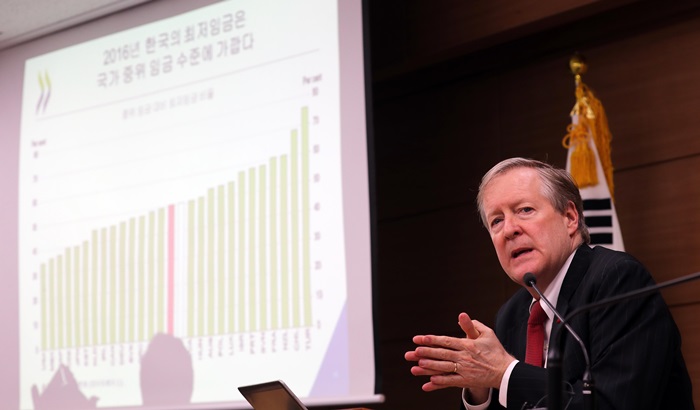-
 Korea.net's 24-hour YouTube channel
Korea.net's 24-hour YouTube channel- NEWS FOCUS
- ABOUT KOREA
- EVENTS
- RESOURCES
- GOVERNMENT
- ABOUT US

Randall Jones, head of the Japan/ Korea Desk at the OECD, announced the “OECD Economic Surveys: Korea 2018” report during a press briefing at the Ministry of Strategy and Finance at the Government Complex-Sejong, in Sejong City on June 20. (Yonhap News)
By Yoon Sojuing and Lee Yoonseo
The Organisation for Economic Co-Operation and Development (OECD) has estimated that the Korean economy will record 3 percent growth this year as well as in 2019.
In the “OECD Economic Surveys: Korea 2018,” the organization said, “Sustained growth of world trade will boost Korean exports, offsetting some slowing in domestic demand due to construction investment.”
The OECD praised the Korean government’s fiscal and monetary policies and its export-driven growth policies, all of which helped the country become a major economy in a short period of time.
It also recommended that the government ease excessive business concentration in the large conglomerates, and that it should guarantee fair competition among conglomerates and small- and medium-sized enterprises (SMEs).
The OECD said Korea became the world’s sixth-largest exporter by pushing export-led growth at the large business groups.
It pointed out that Korea’s low labor productivity continues, however, and that the country has structural issues, such as income polarization between large businesses and SMEs, a low birthrate and an aging society.
Randall Jones, head of the Japan/ Korea Desk at the OECD, officially announced the “OECD Economic Surveys: Korea 2018” report at with a press briefing at the Ministry of Strategy and Finance at the Government Complex-Sejong, in Sejong City.
In the announcement, Jones said, “If the Moon Jae-in government aims to be successful in income-led growth, it needs to boost productivity, and its innovative growth and SME support policies should be successful.”
“Personally, I'm optimistic about the Korean economy,” he said.
“Korea is the No. 1 country in terms of academic achievement and second from the top in gross domestic spending on R&D investment among OECD member states.”
“If the country carries out appropriate policies, just as it did by investing in innovation and education, Korea will be able to reduce the productivity gap and adapt to the changes in population structure in a wise manner,” he said.
clo1120@korea.kr
Most popular
- First hearing-impaired K-pop act hopes for 'barrier-free world'
- Expats could account for 7% of population in 20 years: report
- 'Mad Max' director impressed by 'cinema-literate' Korean viewers
- Show in Italy to present 'thought-filled' Korean craftworks
- Romanian presidential couple visits national cemetery













